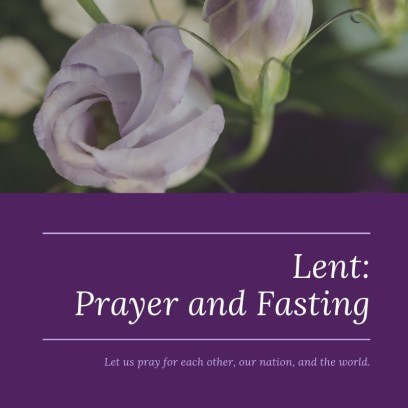Pamela Christian's Blog, page 10
April 1, 2019
April 1-2 2019 – Denying Christ
The Advent of Easter, Part XIV by Pamela Christian—Copyright © 2019

Our culture today is increasingly anti-Christ. In research for my book Revive Your Life! Rest for Your Anxious Heart, I discovered what I believe to be the beginning of this anti-Christ atmosphere that is displacing fundamental values in our modern times.
After study, I concluded that the major cultural shift from most people believing in the existence of God and having respect for and reverence of the Bible with its instruction for life, to the nearly complete rejection of these truths and values began with what’s referred to as the Period of Enlightenment. In the 18th century the French Enlightenment began, ultimately giving rise to the German period, culminating into what’s referred to as Protestant or Theological Liberalism. By the 19th century many people were following the philosophy of Immanuel Kant and Friedrich Schleiermacher.
Theological Liberalism grossly revised thousands of years of the commonly-held beliefs about God, about humanity and about truth itself. Protestant Liberalism tends to emphasize ethics over doctrine and personal experience over Scriptural authority. Theological Liberalism came to dominate American mainline churches in the early 20th century. Liberal Christian scholars encourage people to reject the Bible, to view truth as relative, and conclude that religions are pluralistic and non-doctrinal. Other movements that came from Theological Liberalism includes the Social Gospel, Theological Feminism, the Jesus Seminar, and others that deny the divinity of Christ and the authority of Scripture.
Fast forward to today and what we have are millions of people who have been taught truth is relative, God is what you want Him to be, and mankind is the highest authority. There is no commonly accepted grid, values, or morals, and the result is chaos, division, angst, protesting and in general a very dissatisfied and unfulfilled culture.
Reconsidering what we’ve been taught to believe takes courage. Most of us have been taught what we believe from people we highly esteem. To even question what they taught us feels like an affront to them. At the same time, when I ask people “Who in this room wants to live your life on the basis of a lie?” no one ever raises their hand. As previously posted, unless we intentionally examine what we believe and why we believe as we do, we could easily be deceived and unaware of our condition. After all, the very nature of deception is the victim is unaware. Since the nature of deception means the victim is unaware of their condition, any of us can be deceived.
Jesus claimed “I am the way, and the truth, and the life. No one comes to the Father except through me” (John 14:6 ESV). He couldn’t be more clear, yet many to this day refuse to believe. Some decry offense, because they view the claim that Jesus is the only way as exclusive. Other’s point to the existence of many different religions and believe we should consider them all equally valid. And a growing number of people are concluding there is no God. These views are all borne from the rejection of divine revelation in favor of human reason. Where do you stand concerning these and similar claims that refute Jesus, Christianity and God?
Any measure of doubt or disbelief tremendously hinders our ability to experience a vital connection with God through faith in Jesus. It’s very difficult to live in this fallen world and not be adversely impacted by popular culture, ideals, and philosophies. Yet Christians are admonished to understand they are presently in this world but no longer of the world. We are to live with a confident faith conviction and from this foundation we can experience the promises of God for our lives on earth. If, as a Christian, you are not enjoying a confident faith—a single focused, unwavering faith—I suggest you have adopted and commingled worldly ideas with your knowledge of Jesus.
Confession and repentance are two significant aspects of this Lenten Season. Consider what you believe and identify those areas where you have any measure of unbelief, doubt, or uncertainty. Understand, it is not a sin to have unbelief, doubt, or be uncertain. But, to knowingly remain in that condition without intentionally seeking to discover the resolution of truth, will adversely impact your faith. Take time in the next few days praying and asking the Holy Spirit to reveal weak areas of your faith. Imagine how glorious your life will be once you truly possess a vibrant, confident, unwavering faith! If you have “mountains” in your life you need removed, it’s essential you have faith without doubt.
The great divide Jesus creates is the topic for the next blog post.
For April 1-2, 2019 read and meditate on the following Scriptures:
Isaiah 53:3; Matthew 10:33; Matthew 13:53-58; Mark 8:38; Mark 11:23-24; Acts 3:13-15; Romans 1:16-32; 2 Corinthians 10:3-6; Titus 1:16; James 1:1-8; 2 Peter 2:1; 1 John 2:22
Scroll down below to access earlier posts in this series. To view the entire list of planned devotions, see the Introduction.

Note: All the books in the award-winning Faith to Live By series are written to help people discover and live in life-giving truth. Visit the Author Page to learn more about the different books. When you purchase any of my products, you are helping support the ministry and spread the gospel of Jesus.
March 30, 2019
March 30-31, 2019 – Our New Commission in Christ
The Advent of Easter, Part XIII by Pamela Christian—Copyright © 2019

God’s will for us is to discover our true God-intended purpose in life. For this reason, Jesus came in human form to provide a way for us to be restored into right relationship with God. Those of us who are restored, find far greater hope for our earthly lives and elation concerning our future than we could have imagined. And those of us who have discovered truth, are commissioned by Jesus, and given His authority to help others discover the same life-giving truth we’ve been blessed to find.
Jesus’ entire ministry was a ministry of reconciliation. He is our example of how we are to live our new lives in Christ. Therefore, each and every Christian is called and commissioned to be a part of His ministry of reconciliation.
God created humanity with intrinsic needs. These include: the need to be loved; the need to belong; and the need to be significant. These basic, needs remain even after the fall of humanity—or what’s also referred to as Original Sin, when Adam and Eve rejected God. God’s original plan was for us to have these basic needs met in our relationship with Him. However, since the fall, every human being is born as natural enemies against God. Unless a person discovers the truth of God, the truth of humanity, chooses to repent, and believe in and receive Jesus as Savior and Lord, they will seek to have their basic needs met in any place other than God.
With our culture convinced of popular secular claims such as truth is relative, and believing the Bible and the Church are not relevant for today, the majority of people are on wayward paths in their effort to have their basic needs met. Our culture has been steeped with the idea that there is no beginning and no end—life on earth as we know it, is all there is. While they believe this, they cannot, however, deny the unsettled feelings they have in searching to have their basic needs satisfied.
Now that we’ve discovered truth, we bask in the love of God, in the community of God, and embrace our new purpose in life, how can we keep such a glorious reality to ourselves? The Christian faith is uniquely able to satisfy all our basic human needs. Despite the fact we have utterly rejected God, He still goes to great lengths to help us find our way back and into right relationship with Him. What a glorious God we serve! What a privilege it is to share with others what Jesus has done and how their lives can be forever changed for the better. All their innate needs can be met, greater hope and joy can be experienced, and they can live abundant, victorious lives.
Christians are commissioned to be Ambassadors for Christ, helping others discover truth. One of the best ways to begin to reach people with truth is to appeal to their basic needs. Inquire if they truly feel loved, accepted, and enjoy a life of meaning and purpose. If they express they don’t, inquire further. Help them explore their feelings of dissatisfaction and help direct them to the only source who can satisfy. Use one of my questions: “Why would you feel any sense of insignificance, unless you were created for significance?” Help them get on a new and right path of discovery.
Each one of us is to help others discover truth. I pray you come alive to this tremendous opportunity this Easter as never before. I love the truth that I have been saved and in my eternal gratitude I want nothing more than to do the will of my heavenly Father. As I say every time I sign off a broadcast, “Christ died for us, the least we can do is live for Him”
Understanding the ways we deny Christ will be the topic of my next post.
For March 30-31, 2019 read and meditate on the following Scriptures:
Matthew 5:14-16; Matthew 28:18-20; Romans 8; 1 Cor 12:12-27; 2 Peter 3:9
Scroll down below to access earlier posts in this series. To view the entire list of planned devotions, see the Introduction.
For author bio and schedule of posts for The Advent of Easter click here.
March 28, 2019
March 28-29, 2019 – Our New Creation in Christ
The Advent of Easter, Part XII by Pamela Christian—Copyright © 2019
 In 2 Corinthians 5:17 we read, “Therefore, if anyone is in Christ, he is a new creation. The old has passed away; behold, the new has come” (ESV). The phrase if anyone is in Christ, refers to a person who has placed their faith in the Promised Redeemer. When a person comes to believe in Jesus as their personal Savior and Lord, they are instantly transformed—the human spirit they were born with is done away, and an entirely new spirit born of God is put in place. This is why we use the term describing Christians as, spiritually born-again.
In 2 Corinthians 5:17 we read, “Therefore, if anyone is in Christ, he is a new creation. The old has passed away; behold, the new has come” (ESV). The phrase if anyone is in Christ, refers to a person who has placed their faith in the Promised Redeemer. When a person comes to believe in Jesus as their personal Savior and Lord, they are instantly transformed—the human spirit they were born with is done away, and an entirely new spirit born of God is put in place. This is why we use the term describing Christians as, spiritually born-again.
This process of God making us into a new creation is also known as regeneration. However the term regeneration can be misleading, simply because re means back or again, and generation means the production of something. God does not fix the original human spirit for a believer. No, He completely does away with the natural born spirit, and generates an entirely new human spirit, holy not unlike the spirits God placed in Adam and Eve. Regeneration, while sometimes perceived to be a step in the process of salvation, is generally understood in Christian theology to be the objective work of God in a believer’s life. Spiritually, it means God brings Christians to new life or causes believers to become born-again from a previous state of separation from God and resulting subjection to the decay of death.
However, unlike Adam and Eve, our new spirits cannot be corrupted. Had Adam and Eve chosen God and His ways, and eaten only of the Tree of Life, their spirits would have been eternally bound to God and incorruptible—the enemy of God would have had no ability to influence them. Unfortunately, Adam and Eve rejected God and His ways, and chose themselves and their own way, causing the spirits within them to die, and bringing death and destruction upon all Creation. This act also meant humanity would be under the governance of Satan, as each human being born since Adam and Eve is born with the same spiritually dead condition. The offspring of Adam and Eve, are all naturally born sinners having inherited the condition from the first man and woman.
Gratefully, God’s love for humanity is so great, He revealed His plan to redeem anyone who chooses to be released from our natural-born condition and restored into a right relationship with God. The Promise was fulfilled in the life, death and resurrection of Jesus. People of the Old Testament era knew of the promise of God given in the Garden of Eden, and by faith they looked forward to the fulfillment of that promise. Those of us in the New Testament era look back by faith in the fulfillment of the promise in the Person of Jesus. For all mankind, salvation comes by faith alone.
The fact New Testament believers have an incorruptible spirit does not mean we won’t ever sin. We will be enticed, influenced, and troubled by the enemy of God like every other human being on earth has suffered. However, because of the complete work of Jesus, once a person places their faith in Him, as God’s promised Redeemer, we are given entirely new spirits that are eternally bound to God. The enemy has no ability to corrupt our new spirits.
Sinful acts committed by born-again believers are sins of the body, not the spirit. Sinful acts committed by unbelievers are sins of the spirit. Our temporal bodies are perishing and will return to the dust from which they came. Our eternal spirits and souls, will be taken to heaven or hell, depending upon the condition of our spirit, upon the death of our bodies.
Especially in light of God promising to create a new heaven and earth once His plan for Redemption of all creation is complete, I find His act of regenerating believers fascinating. It could be said, God is actively creating the new heaven and earth in the present, as an ongoing effort that will culminate in the fullness of time.
As a new creature, we can see and experience the natural world from a spiritual perspective and live the abundant, victorious life Christ died to provide us. As new creatures in Christ, we have a different relationship with the world than before. We now view all matters through the lens of reconciliation. As a new creature in Christ we are also commissioned as Ambassadors for Christ to help God’s will be done on earth as it is in heaven. For this reason, our new commission into the ministry of reconciliation will be the focus of the next post.
For March 28-29, 2019 read and meditate on the following Scriptures:
Genesis 1-3; Psalm 51:10; Isaiah 65:17; Ezekiel 36:26; Mark 16:15-16; John 3:5-8; 2 Corinthians 5:14-19; Ephesians 2:1-10; Colossians 1:15-23
Scroll down below to access earlier posts in this series. To view the entire list of planned devotions, see the Introduction.
Note: Hosting this blog site and the other ministry work I do have expenses that must be covered. If this work is blessing you, please show your support through prayer, sharing with others, and financially. Donate HERE . If I can be of further help to you through prayer or answering questions, please email me at info@PamelaChristianMinistries.com
March 27, 2019
Word for Wednesday – Do You Hear God?
 Hearing God is a topic that brings angst to some, especially for genuine heart-surrendered Christians who do not have a confidence in their ability to hear God. Some people hear God through nature; some through a still small voice; others through nearly audible words spoken to their spirit; and yet others through dreams and visions. Each of us can hear God in a variety of different ways if we are willing to learn how. God speaks to us in many different ways, the most important is His Word—the living Word Jesus, and the written Word, the Bible.
Hearing God is a topic that brings angst to some, especially for genuine heart-surrendered Christians who do not have a confidence in their ability to hear God. Some people hear God through nature; some through a still small voice; others through nearly audible words spoken to their spirit; and yet others through dreams and visions. Each of us can hear God in a variety of different ways if we are willing to learn how. God speaks to us in many different ways, the most important is His Word—the living Word Jesus, and the written Word, the Bible.
As a student of the Bible and my faith of many years, I am exceedingly grateful for the written Word. It is the anchor and plumb line against we are to measure all other ways we hear God. If what we hear does not line up with Scriptures, then it’s not from God. If it’s not from God it’s either your own voice, or that of the enemy. There are only three influences for our ability to hear. The ability to confidently hear from God stems from having a good understanding of the whole of Scripture, which reveals the character, will, and intent of God for humanity, as well as the character, will and intentions of the enemy for humanity. Without a practicing understanding of God’s Word, we can easily be deceived by seemingly good words that aren’t from God.
The Apostle Paul said he wishes we would all prophesy—which is to express the heart of God to both individuals and the world at large. This is enough reason for the enemy of God would seek to hinder our “hearing ability.” If you want to grow in your confidence of hearing God resolve to:
Study the Bible to confidently trust the character, will, and intentions of God for humanity and for you individually. Studying the authentic makes it easy to identify a counterfeit.
Pray for and practice discerning of spirits. This is actually quite easy. When you think you may be hearing from God ask: a) how does the word feel? If you feel encouraged, edified, equipped, lovingly redirected. It’s from God. If you feel upset, confusion, fear, doubt, offense toward a brother, condemned, it’s of the devil. If you feel superior, proud, untouchable, smug, and such, it’s your carnal self. This is one time when feelings can be a good guide to truth.
Learn to center your focus on God while you are in an intentional listening mode. I like to open my prayer journal, and have a dialogue with God. My contribution is in regular font—God’s voice is in italics. I try not to edit what I think I’m hearing God say to me. God is so loving, and kind, and ready to pour encouraging words into us, that I initially tended to dismiss what I heard. I thought it was me hearing what I wanted to hear, which gave opening to the devil to tel me I’m not “all that” so therefore it’s not God. It took practice and openness of mind and heart to realize how much God loves me–how much He loves each and every one of us.
Be expectant of God speaking to you in any circumstance, through any means. The Bible reveals God’s spoken through a burning bush, from the heavens, from a donkey. and more. Really, expect any way.
Resolve to be receptive to God and not let the distractions of the world hinder you. Ezekiel 11:19 from the Amplified Bible reads: “I will give them one heart [a new heart] and I will put a new spirit within them; and I will take the stony [unnaturally hardened] heart out of their flesh, and will give them a heart of flesh [sensitive and responsive to the touch of their God].” With a heart that’s sensitive and responsive to God, your ability to confidently hear God will be greatly enhanced.
If you enjoy what you have read here, please poke around and read some of my other Word for Wednesday posts. Also, I began a 40+ day “Advent to Easter” blog with a new post every other day, to help us focus and get prepared for this highest of Christian holidays. And if you’re not already subscribed to my complimentary bi-monthly ENewsletter, please subscribe. The Newsletter will provide a personal inspiring message for you, some updates about what God’s doing through Pamela Christian Ministries, and the popular section “Faith, Friends, Family, and Food” where I share the best of the best of my own signature recipes. While I love every bit of the work God has me doing through this ministry, my favorite is when I’m invited to speak in person. If you, your church or organization are interested in inquiring, please do. People are often surprised at how easy and reasonable it is to have me speak in person. Use our Contact form and let’s connect.
March 26, 2019
March 26-27, 2019 – Prayer and Fasting
The Advent of Easter, Part XI by Pamela Christian—Copyright © 2019

After salvation, when our spirits have been completely replaced, we need to cooperate with the process of sanctification. To help us resist the ways of the world and to be transformed through the renewing of our mind, various spiritual disciplines are of tremendous help. Spiritual disciplines are experienced in three categories: Inward, Outward and Corporate. Inward disciplines include: meditation, prayer, fasting and Bible study. Outward disciplines include: simplicity, solitude submission and service. Corporate disciplines involve: confession, worship guidance and celebration. With this post, with the focus on the Lenten Season, we’ll consider prayer and fasting.
In his book, Celebration of Discipline: The Path to Spiritual Growth, Richard Foster explains prayer is the discipline that brings us into the deepest and highest work of the human spirit. “Real prayer is life creating and life changing. Prayer is the central avenue God uses to transform us. If we are unwilling to change, we will abandon prayer as a noticeable characteristic of our lives.”1 I can think of several people I know who claim to be Christian who do not exhibit any real interest in prayer, whom I would describe as lackluster Christians with lives visibly more like an unbeliever. For the Christian, prayer is not to be a matter tacked onto their lives—prayer is to be the sustaining essence of their lives.
Scriptures reveal the importance of praying “rightly.” To pray rightly means to think God’s thoughts, to desire the things He desires, to love the things He loves, and to will the things He wills. Communing with God through prayer is an exercise of our faith and knowledge, meaning our effectiveness in prayer will be developed over time and use.
When we are confident we are praying according to the revealed will of God, we should pray with full expectation that change will occur. Learn more about prayer than this post intends to provide through Andrew Murray’s classic book With Christ in the School of Prayer.
Fasting is the discipline of abstaining from food or an activity for spiritual purposes. With spiritual fasting you will experience spiritual increase. The increase may be knowledge, understanding, wisdom, revelation, love, and more. Fasting in the Old Testament was an effort to implore God to intervene, often at times of morning seeking God for hope over a situation. In the Old Testament era the Jews fasted frequently, though there was only one fast prescribed by the law. Once each year on the Day of Atonement the Hebrews were to afflict their souls (Lev. 16:31), which meant fasting (cf. Isa. 58:3).
While there are no compulsory fasts required of Christians today, the New Testament seems to take for granted that children of God would see the need to fast occasionally. Teaching about fasting Jesus said “when you fast” not if you fast. Fasting for New Testament Christians should arise out of a feeling of intense need, not as a ritual or formality. The Bible reveals fasting often accompanied repentance, which is an outward expression of contrition for spiritual rebellion. Scriptures suggests God honors fasting when conducted along with deep and sincere dedication.
In the New Testament since everything God wants for us is available through faith in Christ, fasting is a means to better connect with the heart, mind, and will of God, aiding us in life decisions, clarity of prayers to be uttered, and amending our thoughts to align with His, for example.
Unfortunately, in our culture, spiritual fasting is often considered an option. However, Jesus’ teaching about fasting was the same as His instruction on prayer and giving—all three are to be regular disciplines for the Christian. Martin Luther said, “It was not Christ’s intention to reject or despise fasting . . . it was His intention to restore proper fasting.”2
In this high holy season leading up to Easter, to simultaneously employ the disciplines of both prayer and fasting, confessing our shortcomings and thanking Jesus for His love and transforming power is most appropriate.
Prayer and fasting are disciplines that can help us more fully connect with God and mature us as new creatures in Christ. Our new creation in Christ will be the topic of the next post
For March 24-25, 2019 read and meditate on the following Scriptures:
Matthew 6:16-18; Matthew 9:14-15; Luke 2:37; Luke 5:35; Acts 14:23; 1 Corinthians 7:3-6; James 4:3;
Richard Foster, Celebration of Discipline: The Path to Spiritual Growth, (Harper Collins 1998) p. 33.
David R. Smith, Fasting: A Neglected Discipline (Fort Washington, PA: Christian Literature Crusade, 1969) p. 6
Scroll down below to access earlier posts in this series. To view the entire list of planned devotions, see the Introduction.
Note: All the books in the award-winning Faith to Live By series are written to help people discover and live in life-giving truth. Visit the Author Page to learn more about the different books. When you purchase any of my products, you are helping support the ministry and spread the gospel of Jesus.
March 24, 2019
March 24-25, 2019 Spiritual Renewal
The Advent of Easter, Part X by Pamela Christian—Copyright © 2019
 When a person chooses to place their faith in Jesus as their personal Savior/Redeemer, their spirit is instantly transformed. The Bible refers to this transformation as being born-again, which is the eradication of the sin-born spirit we had from natural conception, and supernaturally replacing it with an entirely new sinless spirit that never existed before.
When a person chooses to place their faith in Jesus as their personal Savior/Redeemer, their spirit is instantly transformed. The Bible refers to this transformation as being born-again, which is the eradication of the sin-born spirit we had from natural conception, and supernaturally replacing it with an entirely new sinless spirit that never existed before.
Understand, God is made in three parts, Father, Son, and Spirit, and creating us in His image, God made us three parts—body, soul, and spirit. Our bodies are the physical housing for our soul and spirit. Our bodies are temporal, whereas our soul and spirit are eternal. Our soul is what makes us unique and distinct from all other humans. The Hebrew words for soul and life comes from the same root word, nephesh (Strong’s 5315). The soul is the seat of man where the will, individual personality, the intellect, desires, emotions, and conscience reside. Our spirit is the part of us that makes it possible to commune spirit to spirit. This communication can be with God and His holy messengers or with fallen, evil angels.
The Bible teaches the Third Person of the Trinity, The Holy Spirit, is also given to indwell us and become our Teacher, Guide, and Counselor to bring us into all truth and help us discern between holy and demonic spirits. As we learn about the standards of the Christian faith through the Word of God (written, spoken, and the study of Jesus) we are further transformed by the renewing of our mind. As our mind is changed, our behavior, attitudes, thoughts, emotions, and such will be increasingly altered more in keeping with the example of Christ’s life. As our mind is changed, our heart and all other aspects of our soul are altered.
The word sanctified actually means to be set apart as, or declared holy, consecrated, and free from sin; purified. From the moment we place our faith in Jesus as our Savior/Redeemer, we are sanctified in the spirit. However, we still have our natural born minds and bodies that need to be trained to come into alignment with the Holy Spirit. We need to deliberately put-off the old or carnal ways of thinking, and intentionally put on the mind of Christ. We need to partner with the Holy Spirit to renew our mind.
While our spirit has been miraculously made new, we are still left in this world able to be influenced by the things of this world. Our mind is the gate through which we receive information. According to the ways we think/believe, we will act. Our mind then is the control center for our soul—our will, individual personality, the intellect, desires, emotions, and conscience. Unless we intentionally work with the Holy Spirit to have our minds renewed, we can be born-again, but remain carnally or worldly minded. Sadly, this is the state of most professing Christians in our culture.
Salvation is a gift of God, made possible because of the life, death and resurrection of Jesus, whom we celebrate in this season. There only requirement to obtaining this gift is to believe Jesus is who He claimed to be. Following we must receive all God wants us to have which comes through the process of sanctification. Sanctification is a process by which our mind, heart, and soul are taught to come into alignment with our new spirit as instructed by the Holy Spirit.
Demographers such as Barna Research Group, estimate approximately 75% of Americans profess the Christian faith. Of this percentage, 25% are merely “Christians” in namesake only—they are not born-again and do not live their daily lives influenced by the Christian faith. Another 25% are born-again but admit they do not allow their Christian faith to determine their every choice. Of the remaining 25% it’s estimated only 7-9% are actually born-again seeking to live their daily lives making every decision based on their faith. With so few self-professed Christians actually living the faith, is it any wonder our culture is in the condition it’s in, or that the Church and the Bible are considered irrelevant today?
Where do you see yourself in all this? Depending, reading my earlier regular blog post, “What Christians Don’t Know About Christianity Promotes Evil” may be helpful for you.
Acquiring disciplines of the Christian faith are essential in the process of sanctification. For this reason, prayer and fasting will be the subject of the next post.
For March 24-25, 2019 read and meditate on the following Scriptures:
Proverbs 4:23; Proverbs 10:11; Proverbs 23:7; Luke 6:45; Romans 12:2-4; 2 Corinthians 10:5; Ephesians 4:18-32
Scroll down below to access earlier posts in this series. To view the entire list of planned devotions, see the Introduction.
For author bio and schedule of posts for The Advent of Easter click here.
March 22, 2019
March 22-23, 2019 – Repentance
The Advent of Easter, Part IX by Pamela Christian—Copyright © 2019
Not enough people understand the gift of repentance. The fact God gave humanity a way of escape from the eternal consequences of utterly rejecting Him is an astonishing wonder. Consider the character, will, and intentions of God that motivated Him to provide us a way of escape. To receive His offer of repentance results in our freedom, our being declared blameless and therefore without guilt.
According to the Greek-English Lexicon of the New Testament (Louw-Nida) repentance means, to change one’s way of life as the result of a complete change of thought and attitude with regard to sin and righteousness. In repentance, a person is given a true sense of the heinous nature of sin and, hating it, they turn to God through faith in Christ with the desire to part ways with sin. True repentance leads to eternal life.1
Grief that comes from God is characterized by repentance. This grief produces remorse caused by the realization of having lost God’s approval and the resulting desire is to reverse one’s heart-position on the matter. Once a person understands sin separates us from God and His favor, the grief experienced will lead them to repentance–which is essentially to agree with God about sin and receive the way God has provided for us to be released from sin. The way God’s provided for our restoration is through faith the life, death, and resurrection of Jesus Christ. Placing our faith in Him as our Savior restores us into right relationship with God. It’s God’s loving kindness, not His judgement that leads people to repentance.
Speaking to the church in Corinth, the Apostle Paul revealed not all repentance is genuine. “For godly grief produces a repentance that leads to salvation without regret, whereas worldly grief produces death” (2 Corinthians 7:10). Worldly grief, as the Apostle Paul reveals, is a remorse from losing the world’s approval, producing the desire to regain the world’s approval, which set’s a person up for death, or divine judgment. Many people teach repentance is changing one’s behavior. In reality, repentance is a change in the condition of the heart. True repentance is to see our sin condition for what it is, and decide to align ourselves with God’s standards. As a result, a change of heart occurs and the behavior is automatically adjusted. All of our actions and the words we speak, reveal the condition of our heart.
A person could be a genuine born-again Christian who has not accepted a particular practice as sinful, who continues the sinful practice. This individual sets him/herself up for revelation and discipline. An example would be a person who knows God’s standards about sex outside marriage, yet elects to continue the practice because of the world’s acceptance of sex outside marriage. As a born-again believer this person will experience internal conflict as the Holy Spirit continues to convict, wanting to bring the person to true repentance. Christians who reject the conviction from the Holy Spirit who sear their conscience are then considered willfully sinning, where the discipline is more severe.
Conversely, a person could be a genuine born-again Believer, who knows their heart needs changing in a given area in order to put an end to a sinful practice. They recognize the issue as sin, and deeply want their heart to be changed, but they suffer in actually gaining victory in this area. This could be due to a deception, trauma, demonic stronghold, curse, or familiar spirit. A born-again Christian who continues to suffer the practice of sin, who seeks the Lord for His help, while failing to find victory, is not condemned. He is, however, continually convicted. The Holy Spirit won’t let such a person alone until they attain victory. If you find yourself in this situation, seek Pastoral counseling and assistance for the victory Christ died to give you. It’s the enemy of God, who seeks to prevent us from walking in the fullness of freedom we can have through faith in Christ.
Evidence that a person is truly born-again is visible based on how a person responds to sin. Sin truly troubles a genuine believer, whereas sin doesn’t bother a sinner in the least. A sinner is simply doing what comes naturally. True repentance hates sin; false repentance hates the consequences of sin.
A truly repentant Christian, who understands their new righteous standing before God, should be as bold as a starving lion to boldly apply God’s Kingdom agenda on earth as it is in heaven. With an understanding of the authority Jesus gives those who confess their sin, repent, and choose to follow Him, Christians should be actively subduing the enemy and advancing God’s will on earth. We have a glimpse of the impact personal repentance can have. Now, imagine the impact corporate repentance could have, especially in light of Matthew 29:18-20.
In this season of Lent, ask the Lord to examine your heart and show you any areas where you need to repent. Genuinely born-again Believers are miraculously given an entirely new spirit, and become new creatures in Christ. Renewal of our spirit will be the subject of the next post.
For March 22-23, 2019 read and meditate on the following Scriptures:
Matthew 3:8; Matthew 29:18-20; Luke 5:31-33; 2; John 1:6-10; Acts 3:9; Acts 11:18; Acts 20:21; Romans 2:4; 2 Corinthians 7:9; 2 Tim. 2:25; Hebrews 12:3-11
Adriel Sanchez True vs. False Repentance: What’s the Difference?
https://corechristianity.com/resource...
Scroll down below to access earlier posts in this series. To view the entire list of planned devotions, see the Introduction.
Note: Hosting this blog site and the other ministry work I do have expenses that must be covered. If this work is blessing you, please show your support through prayer, sharing with others, and financially. Donate HERE . If I can be of further help to you through prayer or answering questions, please email me at info@PamelaChristianMinistries.com
March 20, 2019
Word for Wednesday – Do You Trust God for All Things?
In this “Word for Wednesday” I want to have us truly consider the question, Do I trust God for all things?

One indicator of our trust level, is the way we pray. What words, phrases, and emotions do you express when you pray? We know we are to approach God in prayer with all thanksgiving, then let our requests be made known to Him. Philippians 4:6 states, ” . . .do not be anxious about anything, but in everything by prayer and supplication with thanksgiving let your requests be made known to God.”
Think back over the last couple times you’ve spent time in prayer with God. When you prayed did you display any level of pleading, begging, frustration, anxiety, worry, fear, dread and the like? If so, you have evidence of areas of where your trust in God is weak.
Weak trust in God is always based on a misunderstanding of the character, will, and intention of God, as revealed in His Written Word. The misunderstanding can be due to sheer ignorance—never being taught or exposed to the truth, or having been incorrectly taught about God. Misunderstanding the character, will, and intention of God can also be from deception and confusion implanted by the enemy of God—Satan, the Father of all Lies. In the Garden of Eden Satan deceived Eve and Adam by sowing seeds of doubt and also appealing to the pride of the eye, the lust of the flush and the pride of life. Through wily and intentional efforts the enemy successfully caused the first man and woman to doubt God’s instructions and His intentions for them, bringing them to reject God and His ways, preferring instead what they believed was their own way, when in fact it was the way of the devil.
Another question for us today is Do I really want to personally know God or do I merely want what He can do for me? Again, any fear or hesitancy on your part to want to personally know God, is evidence of misunderstanding the character, will, and intention of God. 1 John 4:16 reads, “So we have come to know and to believe the love that God has for us. God is love, and whoever abides in love abides in God, and God abides in him.” God is love. It’s God’s love for us that motivates everything He does for us. If you tend to emphasize the truth that God is also Judge, then you don’t have a proper understanding. God’s judgment undo condemnation is preserved for those who reject Him. For those who love God, the judgment is discipline to help us in our understanding and response to Him. He wants us to be in a position to receive all the good and perfect blessings He has for us. Christ was born, lived, and died to fulfill the penalty of humanity’s rejection of God, to redeem those who will believe, who then become joint heirs with Him. Everything that belongs to Christ, is available for us. Yet, how many Christians do we see actually living a life in the manner of Jesus?
When Jesus prayed to the Father, He prayed first with requests consistent with the will of God. Then based on 1 John 5:14 (ESV) “And this is the confidence that we have toward him, that if we ask anything according to his will he hears us,” Jesus boldly petitioned the Father. If we are confident we are praying according to God’s will, we have every reason to believe the prayer will be answered. God’s will is revealed in His Written Word, in the Living Word of Jesus, in our spirit by the counsel of the Holy Spirit. If God’s specific will is unclear, we can lean on His character and His proven excellent intentions in our lives and the lives of others.
This truth does not mean we will escape every hardship and adversity in life. No, we will experience adversity, which we must understand does not come from God. Life adversities and hardships are a result of sin in this world. However, Jesus’ life, death, and resurrection assures us the victory to overcome every obstacle of life. We have to partner with God and His Power to overcome—the victory is achieved by partnering with God.
Prayers we lift up according to the will of God, that do not involve the will of any human being, such as having our physical needs met, we can pray with utter confidence and thankful expectation for His answer to our prayers in His perfect timing. Prayers that intersect with the human will, such as praying for the salvation of loved ones, are subject to choices our loved ones make. Therefore, when praying for matters that are impacted by human will, ask God to bring people, situation, and circumstances into their lives to cause them to choose correctly.
I understand what it’s like to have matters lifted up in prayer to God for years and not experience the prayer answered. This can be due to spiritual warfare or praying amiss. If it’s spiritual warfare, we are to wage against the enemy of God—the powers and principalities and rulers of darkness. Praying amiss is praying with anxiety, doubt, fear and such. James 1:6-8 makes abundantly clear “But he must ask in faith without any doubting, for the one who doubts is like the surf of the sea, driven and tossed by the wind. For that man ought not to expect that he will receive anything from the Lord, being a double-minded man, unstable in all his ways.”
Let me ask you one last question for today: How is it you can trust God for your eternal supernatural future, but have difficulty trusting Him for your temporal natural concerns?
Note: I recently spoke before a group of seasoned ministers, pastors, and church leadership. In prayerfully seeking the Lord about what topic He wanted me to speak on, I heard “Money.” I have never presented a message about money. Yet, I will say this was one of the most impacting messages the Lord has had me present yet. The message is entitled “Faith and Finances.” If you think your church can benefit from sound, biblical messages such as “Faith and Finances” or any other topics I discuss, please us our CONTACT page so we can explore my presenting further.
Do You Trust God for All Things?
In this “Word for Wednesday” I want to have us truly consider the question, Do I trust God for all things.

One indicator of our trust level, is the way we pray. What words, phrases, and emotions do you express when you pray? We know we are to approach God in prayer with all thanksgiving, then let our requests be made known to Him. Philippians 4:6 states, ” . . .do not be anxious about anything, but in everything by prayer and supplication with thanksgiving let your requests be made known to God.”
Think back over the last couple times you’ve spent time in prayer with God. When you prayed did you display any level of pleading, begging, frustration, anxiety, worry, fear, dread and the like? If so, you have evidence of areas of where your trust in God is weak.
Weak trust in God is always based on a misunderstanding of the character, will, and intention of God, as revealed in His Written Word. The misunderstanding can be due to sheer ignorance—never being taught or exposed to the truth, or having been incorrectly taught about God. Misunderstanding the character, will, and intention of God can also be from deception and confusion implanted by the enemy of God—Satan, the Father of all Lies. In the Garden of Eden Satan deceived Eve and Adam by sowing seeds of doubt and also appealing to the pride of the eye, the lust of the flush and the pride of life. Through wily and intentional efforts the enemy successfully caused the first man and woman to doubt God’s instructions and His intentions for them, bringing them to reject God and His ways, preferring instead what they believed was their own way, when in fact it was the way of the devil.
Another question for us today is Do I really want to personally know God or do I merely want what He can do for me? Again, any fear or hesitancy on your part to want to personally know God, is evidence of misunderstanding the character, will, and intention of God. 1 John 4:16 reads, “So we have come to know and to believe the love that God has for us. God is love, and whoever abides in love abides in God, and God abides in him.” God is love. It’s God’s love for us that motivates everything He does for us. If you tend to emphasize the truth that God is also Judge, then you don’t have a proper understanding. God’s judgment undo condemnation is preserved for those who reject Him. For those who love God, the judgment is discipline to help us in our understanding and response to Him. He wants us to be in a position to receive all the good and perfect blessings He has for us. Christ was born, lived, and died to fulfill the penalty of humanity’s rejection of God, to redeem those who will believe, who then become joint heirs with Him. Everything that belongs to Christ, is available for us. Yet, how many Christians do we see actually living a life in the manner of Jesus?
When Jesus prayed to the Father, He prayed first with requests consistent with the will of God. Then based on 1 John 5:14 (ESV) “And this is the confidence that we have toward him, that if we ask anything according to his will he hears us,” Jesus boldly petitioned the Father. If we are confident we are praying according to God’s will, we have every reason to believe the prayer will be answered. God’s will is revealed in His Written Word, in the Living Word of Jesus, in our spirit by the counsel of the Holy Spirit. If God’s specific will is unclear, we can lean on His character and His proven excellent intentions in our lives and the lives of others.
This truth does not mean we will escape every hardship and adversity in life. No, we will experience adversity, which we must understand does not come from God. Life adversities and hardships are a result of sin in this world. However, Jesus’ life, death, and resurrection assures us the victory to overcome every obstacle of life. We have to partner with God and His Power to overcome—the victory is achieved by partnering with God.
Prayers we lift up according to the will of God, that do not involve the will of any human being, such as having our physical needs met, we can pray with utter confidence and thankful expectation for His answer to our prayers in His perfect timing. Prayers that intersect with the human will, such as praying for the salvation of loved ones, are subject to choices our loved ones make. Therefore, when praying for matters that are impacted by human will, ask God to bring people, situation, and circumstances into their lives to cause them to choose correctly.
I understand what it’s like to have matters lifted up in prayer to God for years and not experience the prayer answered. This can be due to spiritual warfare or praying amiss. If it’s spiritual warfare, we are to wage against the enemy of God—the powers and principalities and rulers of darkness. Praying amiss is praying with anxiety, doubt, fear and such. James 1:6-8 makes abundantly clear “But he must ask in faith without any doubting, for the one who doubts is like the surf of the sea, driven and tossed by the wind. For that man ought not to expect that he will receive anything from the Lord, being a double-minded man, unstable in all his ways.”
Let me ask you one last question for today: How is it you can trust God for your eternal supernatural future, but have difficulty trusting Him for your temporal natural concerns?
Note: I recently spoke before a group of seasoned ministers, pastors, and church leadership. In prayerfully seeking the Lord about what topic He wanted me to speak on, I heard “Money.” I have never presented a message about money. Yet, I will say this was one of the most impacting messages the Lord has had me present yet. The message is entitled “Faith and Finances.” If you think your church can benefit from sound, biblical messages such as “Faith and Finances” or any other topics I discuss, please us our CONTACT page so we can explore my presenting further.
March 20-21, 2019 – The Law of God
 The Advent of Easter, Part VIII by Pamela Christian—Copyright © 2019
The Advent of Easter, Part VIII by Pamela Christian—Copyright © 2019
With our focus on the Lenten Season, let’s consider the Law of God as revealed in both the Old and New Testaments. Some people claim Christians are inconsistent in their observance of the Biblical laws, pointing to our maintaining certain sexual behaviors as sin, while violating the laws to not eat pork or shellfish.
What needs to be understood is the Old Testament laws identified three categories of laws: Civil Laws, Ceremonial Laws, and Moral Laws. The Laws are found in the first five books of the Old Testament, believed to have been written by Moses, therefore the Laws are often referred to as the Mosaic Laws.
The Civil laws governed the earthly nation of Israel. The Ceremonial Laws governed the temple sacrifices and practices. The Moral Laws identified what God deems right and wrong, which includes the Ten Commandments. These laws were for the nation of Israel, God’s chosen people.
Jesus said the Law was perfect and stated heaven and earth would pass away before the Law would fail. God established the Laws to reveal to mankind the high and holy standard we are to live. At the same time the Law reveals, without God’s intervention, we cannot possibly fulfill the Law.
The Apostle Paul, the only Apostle the Bible records was taken into the third heaven, taught those who are born-again are released from the Law because Jesus personally fulfilled the Law. Every Law pointed to Jesus, and Jesus upheld and completed the requirements of the Law. With that, Jesus then established a new and better way..
The Civil Laws were established for the natural nation of Israel. However, Jesus provided the way for a new Israel—a spiritual Israel comprised of all who believe in and receive Jesus as their Redeemer—the Church. God doesn’t have a nation-state on earth any more. However, the principles of Old Testament civil laws are excellent guidelines for social order.
The Ceremonials Laws were established to identify what is clean/holy and what is unclean/unholy. The sacrificial system revealed the tremendous gap between sinful humanity and a perfect God, and how costly it would be to bridge that gap.1 Understanding Jesus to be the ultimate sacrifice once and for all, we no longer need the lesser forms of animal sacrifice. Jesus’ life, death, and resurrection makes what was unclean, clean (Gentiles, foods, and more).2
The Moral Laws are also fulfilled in Jesus in that He kept all of them perfectly, every day in His earthly life. The Moral Laws reflect God’s standard of good and evil, and right and wrong and His immutable character. Since God’s views on morality don’t change, Jesus taught us to uphold the Moral Laws.
Because Jesus fulfilled all the Law, and established a new way—a way of grace—we are no longer bound by the Law. This is known as the New Testament, but a better term is New Covenant. Our ability to be in right standing with God through the Law, has been fulfilled by Jesus. By placing our faith in Him, we are now able to be in right standing with God, through God’s grace.
As stated in an earlier post, God has created this world with both natural and spiritual laws. Whether we are aware of them or not we are subject to them all of us, regardless of our chosen religious beliefs. My book Renew Your Hope! Remedy for Personal Breakthroughs explores the various laws of God in overview.
Salvation is the first step of being transformed in Christ. The ongoing process is known as sanctification, which is the topic for the next post.
For March 20-21, 2019 read and meditate on the following Scriptures:
Matthew 5:17-18; Romans 3:20; Romans 7:1-6; Romans 10:13; 2 Corinthians 12:1-4; Galatians 3:25; Matthew 5:11; Mark 7:19; Acts 10:15; Acts 11:9
For deeper understanding of the New Covenant visit:
https://www.gotquestions.org/new-covenant.html
Footnotes:
“Why Don’t We Follow All of the Old Testament Laws?” by J.D.Greear, https://jdgreear.com/blog/why-dont-we-follow-all-of-the-old-testament-laws/
“Jesus Declares All Food Clean” by Dr. D. Lance Waldie http://harvestbiblechurch.net/blog/jesus-declares-all-food-clean
Scroll down below to access earlier posts in this series. To view the entire list of planned devotions, see the Introduction.
Note: All the books in the award-winning Faith to Live By series are written to help people discover and live in life-giving truth. Visit the Author Page to learn more about the different books. When you purchase any of my products, you are helping support the ministry and spread the gospel of Jesus.



